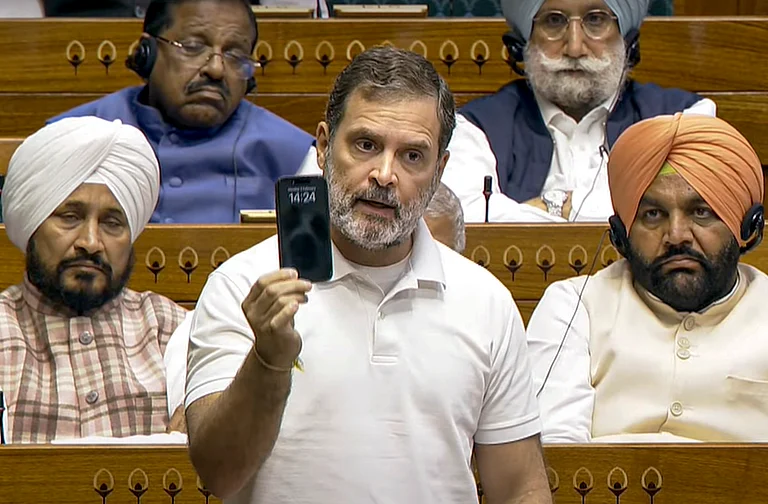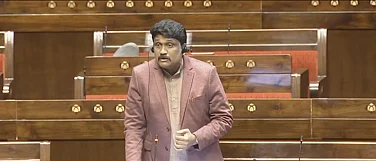The vital issue of clean air and water is missing from the Uttar Pradesh elections though several cities here often figure in the list of the world's 10 most polluted.
Despite clean water and air being the mainstay of life, major political parties, except for the Samajwadi Party, Congress and the Rashtriya Lok Dal, have not included the issue of environmental protection prominently in their election manifestos.
Even for the parties that mentioned it, the concern for environment remains on paper as everyone is busy talking about Jinnah, Pakistan, vote bank politics and 'pariwarvad' to sway voters to their sides.
Samajwadi Party president Akhilesh Yadav has a degree in environmental engineering from Australia but his party manifesto just has a reference about climate issue sans any major announcement to deal with the problem.
Even the Congress has touched on some aspects of climate change in its manifesto, but has not spoken of any concrete initiative.
The issue hasn't got much importance in BJP poll manifesto.
The saffron party has mentioned cleaning of the river Ganga but has not mentioned anything about countering climate change.
According to a report by climate think tank 'Climate Trends', the Indus-Gangetic plains are the most polluted areas in the country in terms of air. At the heart of this vast landmass, 99.4 per cent of the population of Uttar Pradesh lives in areas where air pollution levels exceed safe limits.
Senior state BJP leader and State Pollution Control Board chairman JPS Rathore told PTI why scientists have repeatedly expressed concerns about poor air quality.
"The issues which are liked by the public have to be taken forward. The issue of environmental protection will become the public's issue after 10 years. Right now, employment and development are the main issues for the people."
Asked why the BJP is not making climate change an issue of political discourse despite being a major political party, Rathore said, "We are serious about it and are doing concrete work at the ground level. But right now it is for the people. It won't become an issue as other things are more necessary for them at the moment."
State Congress spokesperson Ashok Singh said, "When the prime minister of the country tries to give a turn to the elections by linking political opponents and terrorism then how can the issue of climate change stand."
He said that as far as the Congress is concerned, it has made many promises in its manifesto to take concrete steps to tackle climate change which will be fulfilled when the party comes to power.
Significantly, in the Air Quality Index, various cities of Uttar Pradesh are still on the top in terms of pollution. Among these, Kanpur, Lucknow and Ghaziabad are prominent.
Especially in the case of Particulate Matter (PM) 2.5, the situation is alarming. PM 2.5 is a fine particle that can enterers blood vessels of human beings and lead to different types of diseases.
SP's national spokesperson Ashutosh Verma admitted that it is unfortunate that an issue like climate change which is a serious threat to humanity is not an election issue in Uttar Pradesh.
After all the talks of development, the election of the state finally comes down to caste and religion.
However, he claimed that no one has done as much work in the direction of environmental protection as the Samajwadi Party did during its previous tenure.
SP president Akhilesh Yadav is himself an environmental engineer and he understands the gravity of climate change very well. When he forms the government again, he will definitely take more concrete steps towards resolving this issue, said Verma.
Dr Ajay Nagpure, Head of Air Quality Branch at World Resources Institute (WRI) India, said that the whole world is deeply concerned about the grave dangers of climate change and the serious threat to humanity which was expressed at the COP26 summit held in Glasgow in November last year.
He said that for any issue to become a political issue it has to be linked with common people. The problem is that pollution has not yet become an issue of common people. So far this issue is only the issue of the educated class.
"If we look at the reality on the ground and ask common people about their top five problems, then the issue of pollution will not figure in them," he added.
Nagpure said, "The day the issue of pollution will become an issue of public discussion and public concern, it will also become a political issue and political parties will be forced to include it prominently in their manifesto."
Environmental scientist Dr Seema Javed said that the more information reaches the public, the more awareness spreads among them.
In the campaign against tobacco, people were convinced to a large extent that tobacco causes cancer.
As a result, people started abstaining from the use of tobacco. Due to the spread of awareness, legal restrictions were imposed that no person can smoke in public places.
When the issue becomes a concern, then the politicians give priority to it.
She said that the vote bank of any leader is usually rural people so awareness about climate change has to be spread among them. Once pollution becomes an issue of rural people, only then there will be a change in the direction and climate change will become a political issue.


























